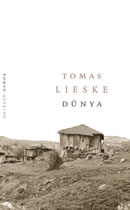Tomas Lieske
Dünya
Vivid picture of a confused world
‘My novels always evolve in the same way: I wait until I have a subject, a theme that I’m passionate about, and then I find a suitable time and place for it,’ Tomas Lieske said in a recent interview. He is not a writer who likes to stay close to home. Dünya, his latest novel, is set in Turkey shortly after the First World War. He has written about Turkey before, in his novel Nachtkwartier (Night Quarters), but not when it was poor and ruined, not at the time of the Armenian genocide - still a burning issue ninety years later.
The story consists of two parts: first we hear the monologue of Dünya Suman, a widow from the rich, fashionable Beyoglu quarter in Istanbul, who has been exiled to rural Turkey for stealing a bottle of perfume from a shop. She becomes housekeeper to two Dutchmen, Simon and Otto, who harbour a secret - they’re looking after a child, a young Armenian girl named Julia, whom they found in a war-torn area. After they fought with the Allies and became prisoners of war - the Netherlands was neutral during the First World War but volunteers fought in the British Army - they were ordered by the Turkish army to cross a devastated region to a deserted, apparently barren plain, to work on a large project commissioned by Ataturk; constructing an airship. At the same time, they have to bring up the girl, who is led to believe she is the daughter of Simon and a young Turkish woman who died. Dünya helps them and develops such a strong bond with the child that she sets aside her own desires - to return to the civilised world, Istanbul in particular - and does all she can to protect Julia and conceal the secret of her origin.
With a great sense of atmosphere, with detail and historical facts, Lieske paints a vivid picture of a desolate, confused world at a politically sensitive time in which there is room for love and ideals. In blurring the boundaries between fact and fiction - the accident with the Hindenburg plays a role - Lieske persuades the reader to believe in the authenticity of his characters and his novel, to be gripped, right to the thrilling dénouement.
Publisher
Querido
Singel 262
NL - 1016 AC Amsterdam
TEL. +31 20 551 12 62
FAX +31 20 639 19 68
E-mail: [email protected]
Website: www.querido.nl
Publishing details
Dünya (2007, 341 pp)

Biography
Tomas Lieske (b. 1943) debuted at the age of 38 with poetry published in the literary journals Tirade and De Revisor. In 1992 his first prose work, Oorlogstuinen (War Gardens), gained him the Geert-Jan Lubberhuizen Prize. In 1996 his novel Nachtkwartier (Night Quarters) was nominated for the Libris Literature Prize, an award he finally received for his novel Franklin (2001). Magic, myth, and chance play a central role in Lieske’s universe. With the successful novel Gran Café Boulevard (2003) he was able to find a prosaic, tempting, and accessible form for expressing the ineffable. In the historical novella Mijn soevereine liefde (My Sovereign Love, 2005), Lieske hones his baroque narrative style sharper than ever.
Dossier
Quotes
There is a very good chance that Lieske will again be nominated for the Libris Literature Prize.
NRC Handelsblad
It is precisely here that Lieske’s greatest literary strength resides: the telling of stories through suggestive imagery.
Vrij Nederland
